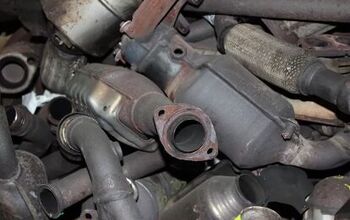Lentz: Hydrogen Sedans By 2015 From A Spread-Betting Toyota

AutomakerS around the world seem to have colluded to turn 2015 into the Hydrogen year. Yesterday in Nagoya (a trip into which TTAC invested 21,160 yen, and the price of a bento box, no freebie jaunts in Japan) , Toyota’s NA CEO Jim Lentz confirmed that the Hydrogen Year is still on the calendar.
Lentz promised that “the first fuel cell sedan coming to the U.S. in 2015.” Fuel cell technology is a high stakes bet, but it is not Toyota’s only one. Said Lentz:
“We will continue to promote more advanced technologies from plug-ins to EVs as well as fuel cells, and we will continue to make improvements to the internal combustion engine.”
This reiterates statements made by Toyota’s new energy maven Satoshi Ogiso two years ago. It is far from clear which alternative energy will succeed in the market, therefore, betting on just one would be, well, ill-advised. To bet on the right technology, said Ogiso, a large automaker must bet on all:
“We must go multi track. We must improve gasoline and diesel engines. We must increase the number of hybrid models. We must produce the plug-in hybrid. We must develop city commuter electric vehicles. We already started small production of fuel cell vehicles. We must do all these improvements at the same time.”
Of course, Toyota remains bullish on hybrid technology. 15 percent of Toyota’s cars sold worldwide are hybrid-powered, Lentz said. Full-size hybrid trucks and SUVs, powered by a hybrid drivetrain jointly developed with Ford, should become available “later in the decade,” Lentz promised.

Bertel Schmitt comes back to journalism after taking a 35 year break in advertising and marketing. He ran and owned advertising agencies in Duesseldorf, Germany, and New York City. Volkswagen A.G. was Bertel's most important corporate account. Schmitt's advertising and marketing career touched many corners of the industry with a special focus on automotive products and services. Since 2004, he lives in Japan and China with his wife <a href="http://www.tomokoandbertel.com"> Tomoko </a>. Bertel Schmitt is a founding board member of the <a href="http://www.offshoresuperseries.com"> Offshore Super Series </a>, an American offshore powerboat racing organization. He is co-owner of the racing team Typhoon.
More by Bertel Schmitt


































Comments
Join the conversation
It's not just infrastructure. Nobody can produce hydrogen cheaply yet. You either steam-strip natural gas. You use up energy and emit carbon dioxide. So why not just burn the NG? The modification for an internal combustion engine to NG from gasoline is on the order of a couple hundred bucks. Or you electrolyse water, which has a 70% efficiency at best. Now you have hydrogen, the least dense gas on the planet. To give a subcompact FCV a 600km range, you have to compress the hydrogen to 10,000psi. That adds another 30% energy penalty to the process. Liquefaction is even more energy intensive and then you have liquid hydrogen at -250C. You have to insulate that, and it will boil off gradually anyway. Guess where those energy penalties come from? Mostly from electricity produced by coal burning power plants. Did I mention that the platinum catalyst in a PEM (polymer electrolyte membrane) fuel cell costs $2500? That's just for the platinum, not the cost of producing an entire power plant. Volume production will not make the platinum cheaper. Increased demand will actually make it more expensive. To contrast, the entire engine in a production car costs a producer ~$2500, and unit costs will go down as production scales up. So until you get free liquified hydrogen at 99.9999% purity, and a fuel cell that uses copper or iron as its catalyst, fuel cells are not going to replace the internal combustion engine.
makuribu, While generally I agree that H2 fuel cells aren't ready for prime time yet either, the bulk of your argument centers around already older technology. The PEM (Proton Exchange Membrane) fuel cells are only really good for constant-demand heat/hot water/power units like an off-grid base load generator for a home or slightly larger building. Solid Oxide fuel cells require no expensive precious metals and don't require pure reformed Hydrogen as fuel. They operate at a temperature high enough to efficiently self-reform hydrogen from natural gas which is an existing infrastructure. Battery storage would still be required to operate a vehicle while the SOFC is brought up to temp and may be required to smooth power demand as I don't know how responsive to variable loads the stack would be, it's a much more logical approach for a consumer product.
Why not just take the hydrogen weigh it down with a little carbon (there's plenty of CO2 floating around out there) and make methane(natural gas) Its a perfect fuel for ICE applications, older cars could even be retrofitted, and we have allot of infrastructure already. If we woke up tomorrow and found a cheap, abundant source of hydrogen, I think that would be the way to go.
Hydrogen, not being naturally available as a free gas on this planet can only be produced by doing something like stripping it from methane, electrolysis or whatever. It is thus not a PRIMARY fuel. Electricity is similar. It has to be produced from other PRIMARY fuel or energy sources like hydro, wind, solar. Thus hydrogen and electricity can be thought of as energy transporters, high quality refined energy. This is not a revelation, before the internet and the rise of uninformed opinion being thrust foremost and center into our faces, it was an accepted fact in technical circles. Using it frivolously to power vehicles is dumb public policy when we live in a world devoid of thorium fusion reactors, and where we waste PRIMARY energy to produce secondary energy to power bulk systems that should have used PRIMARY energy in the first place. It is a technically dumb thing to do. But pseudo technobabble has also given us vehicular ethanol, which outside of Brazil and their sugar cane distillations, has led to refining the stuff from corn of all things, where it takes 70% of the energy in a liter of ethanol to produce the damn stuff. We are living in a fantasy world, and it gets crazier by the day. It's all made worse by people not being able to discern the difference between reality and their 8th grade understanding of science as taught them by Miss Smith with her English degree, and then assuming their opinion is worth listening to. It's not a vote. Meanwhile, one assumes Toyota knows this, but as a commercial entity has to cover its ass by having vehicles powered by anything up to and including donkey piss, if some lobby comes forward elucidating us on its particular benefit and gains a cadre of politicians willing to suspend disbelief for baksheesh. Can't be much fun when your future could well be dictated to by technical nitwits, so you have to be ready for anything, including the harvest and storage of rainbows in a gas tank sized object.